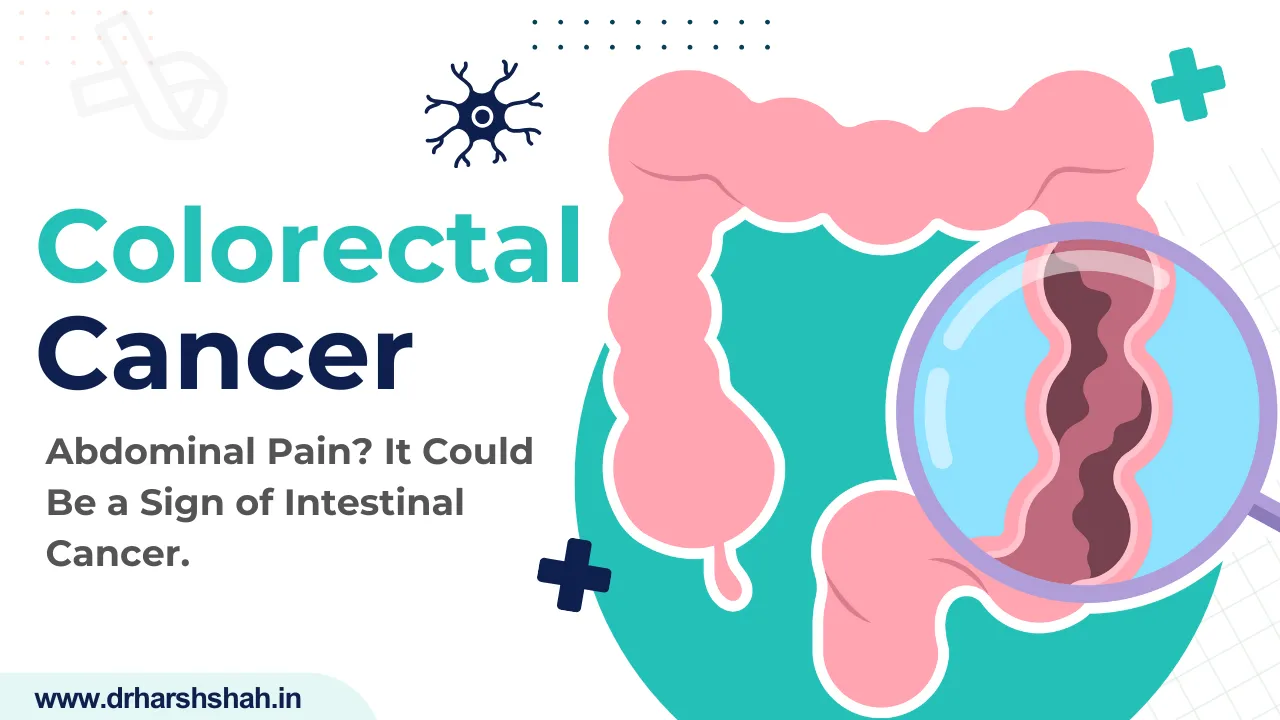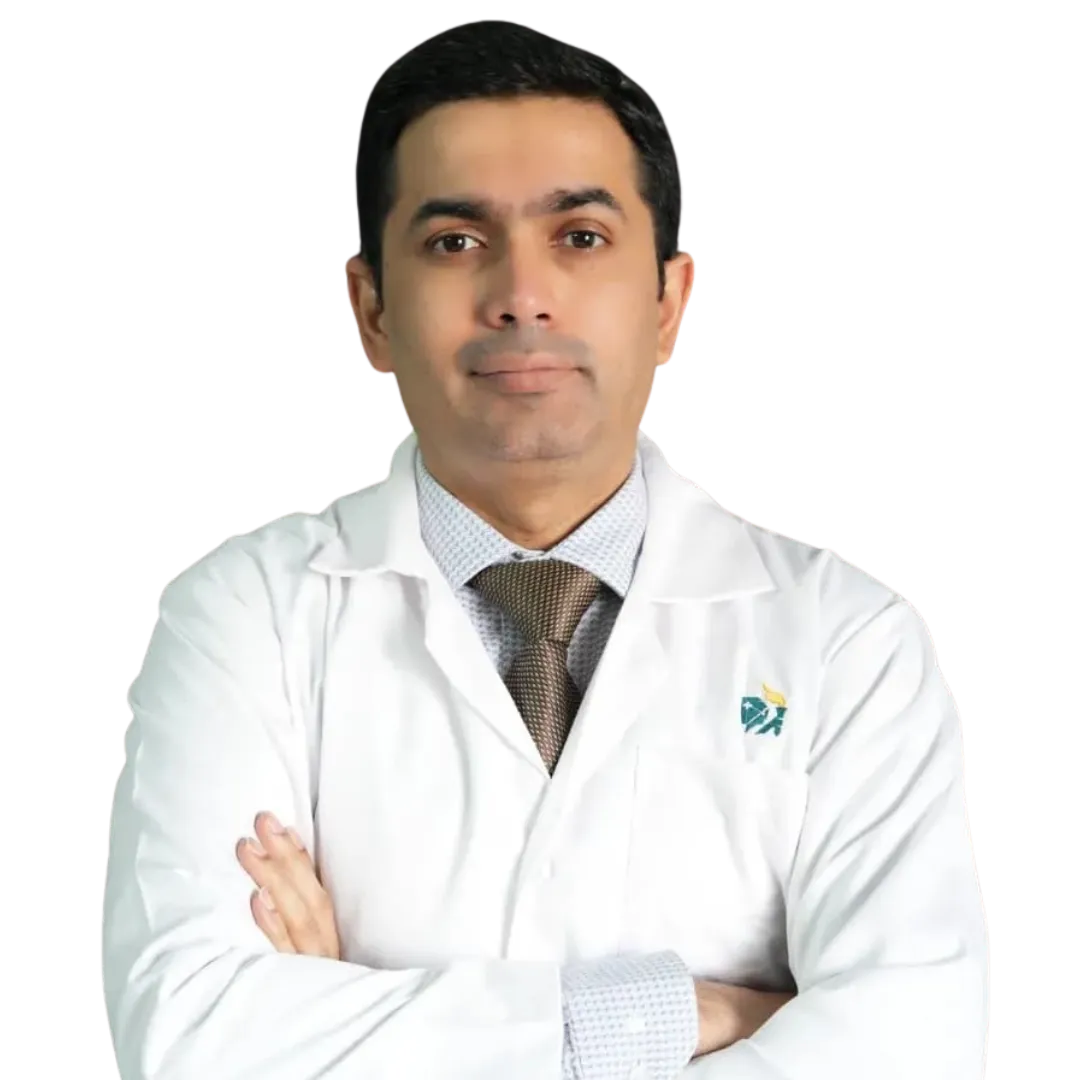Colorectal Cancer
Abdominal Pain? It Could Be a Sign of Intestinal Cancer.
Home > Blogs > Colon Cancer > Overview > Colorectal Cancer
Summary
- Causes
- Symptoms
- Diagnosis

Facts
- Colorectal cancer is the third most common cancer in the world.
- It often starts as small growths called polyps that can become cancerous over time.
- Both men and women are equally at risk of developing colorectal cancer.
- Screening tests, like colonoscopies, can detect colorectal cancer early, even before symptoms appear.
- Lifestyle changes, such as eating a high-fiber diet and exercising regularly, can reduce the risk of colorectal cancer.
Know More
- Colorectal cancer develops slowly and may take years to show symptoms.
- It usually starts as non-cancerous polyps that grow inside the colon or rectum.
- Regular screening, especially after the age of 50, is important for finding these polyps before they turn into cancer.
- If caught early, colorectal cancer can be treated successfully, which is why screening is so important.
Symptoms
- Changes in Bowel Movements
- Blood in Stool
- Unexplained Weight Loss
- Abdominal Pain
- Tiredness or Weakness
- Long-term Diarrhea or Constipation
- Feeling Like the Bowel Isn’t Empty
- Cramping or Bloating
- Thin Stools
- Rectal Bleeding
⦿ Changes in Bowel Movements: You might have diarrhea or constipation more often or feel like your bowel is not emptying completely.
⦿ Blood in Stool: Blood may appear red or dark, showing there might be bleeding in the colon.
⦿ Unexplained Weight Loss: Losing weight suddenly without changing your diet or exercise can be a sign of colorectal cancer.
⦿ Abdominal Pain: Ongoing stomach or lower belly pain, cramping, or discomfort.
⦿ Tiredness or Weakness: Feeling weak or tired often, which could be from blood loss or your body fighting the disease.
⦿ Long-term Diarrhea or Constipation: Ongoing trouble with bowel movements, like loose stools or difficulty passing them.
⦿ Feeling Like the Bowel Isn’t Empty: A constant urge to use the bathroom, even after having a bowel movement.
⦿ Cramping or Bloating: Stomach discomfort that doesn’t go away and may get worse over time.
⦿ Thin Stools: Stools that are thinner than usual, possibly caused by a blockage in the colon.
⦿ Rectal Bleeding: Blood seen in the toilet or on toilet paper after a bowel movement.
Causes
- Age (50 and Above)
- Family History
- High Consumption of Red or Processed Meat
- Low Fiber Intake
- Lack of Physical Activity
- Chronic Bowel Inflammation (IBD)
- Overweight or Obesity
- Tobacco Use
- Excessive Alcohol Consumption
- Type 2 Diabetes
⦿ Age (50 and Above): Colorectal cancer is most common in people over 50, though it can affect younger individuals too.
⦿ Family History: Having close family members with colorectal cancer can increase your risk.
⦿ High Consumption of Red or Processed Meat: Eating too much red meat or processed food can raise the chances of developing colorectal cancer.
⦿ Low Fiber Intake: A diet that lacks fiber may lead to digestive problems and higher cancer risk.
⦿ Lack of Physical Activity: Not exercising enough can increase the likelihood of colorectal cancer.
⦿ Chronic Bowel Inflammation (IBD): Diseases like Crohn's or ulcerative colitis, which cause long-term inflammation, can raise cancer risk.
⦿ Overweight or Obesity: Being overweight increases the risk of developing colorectal and other cancers.
⦿ Tobacco Use: Smoking regularly is linked to many cancers, including colorectal cancer.
⦿ Excessive Alcohol Consumption: Drinking too much alcohol raises the risk of colorectal cancer.
⦿ Type 2 Diabetes: People with type 2 diabetes often face a higher risk of colorectal cancer.
Diagnosis
- Colonoscopy
- Biopsy
- Fecal Occult Blood Test (FOBT)
- CT Colonography
- Flexible Sigmoidoscopy
- Blood Tests
- Stool DNA Test
- Imaging Tests (CT, MRI)
- Carcinoembryonic Antigen (CEA) Test
- Digital Rectal Exam
⦿ Colonoscopy: A procedure where a small camera checks the colon and rectum for abnormalities or polyps.
⦿ Biopsy: Tissue samples taken during a colonoscopy are analyzed for cancer cells.
⦿ Fecal Occult Blood Test (FOBT): A lab test to detect hidden blood in the stool, which can be a sign of cancer.
⦿ CT Colonography: A specialized X-ray scan to create detailed images of the colon.
⦿ Flexible Sigmoidoscopy: A similar procedure to a colonoscopy, but it only examines the rectum and lower part of the colon.
⦿ Blood Tests: To check for cancer-related markers in the bloodstream.
⦿ Stool DNA Test: This test looks for abnormal DNA in the stool, which may be a sign of colorectal cancer.
⦿ Imaging Tests (CT, MRI): To check for the spread of cancer to other organs.
⦿ Carcinoembryonic Antigen (CEA) Test: A blood test that looks for proteins linked to cancer.
⦿ Digital Rectal Exam: A physical exam where the doctor checks for abnormalities in the lower rectum.
Treatments
- Surgery
- Chemotherapy
- Radiation Therapy
- Targeted Therapy
- Immunotherapy
- Ablation or Embolization Procedures
- Robotic Surgery
- Palliative Care
- Clinical Trials
- Lifestyle Changes (Diet and Exercise)
⦿ Surgery: The most common treatment, especially in early stages, where the cancerous tissue is removed.
⦿ Chemotherapy: Medications used to kill cancer cells, typically after surgery.
⦿ Radiation Therapy: High-energy beams aimed at cancer cells, often used for rectal cancer.
⦿ Targeted Therapy: Drugs that target cancer cells directly, minimizing harm to healthy cells.
⦿ Immunotherapy: Strengthens the immune system to better recognize and fight cancer cells.
⦿ Ablation or Embolization Procedures: Treatments for small tumors, particularly when cancer has spread to other organs.
⦿ Robotic Surgery: A minimally invasive surgery to remove smaller tumors, resulting in quicker recovery.
⦿ Palliative Care: Focuses on relieving symptoms and enhancing the quality of life for patients with advanced cancer.
⦿ Clinical Trials: Research studies offering new, experimental treatments.
⦿ Lifestyle Changes (Diet and Exercise): Maintaining a healthy diet and active lifestyle helps with recovery and reducing recurrence.
Treatment Options and Outcomes
| Treatment | Indications | Common Side Effects | Expected Outcomes |
|---|---|---|---|
| Surgery | Early-stage cancer, localized tumors | Pain, infection, bowel changes | Potentially curative if localized |
| Chemotherapy | Advanced or metastatic cancer | Nausea, fatigue, hair loss | Can shrink tumors, prolong survival |
| Radiation Therapy | Rectal cancer or inoperable tumors | Skin irritation, fatigue, bowel issues | Tumor shrinkage, symptom control |
| Targeted Therapy | Advanced cancer with specific mutations | Diarrhea, high blood pressure, fatigue | Tumor control, slow progression |
| Immunotherapy | Advanced cancer with immune markers | Immune-related side effects (inflammation) | Long-term tumor control in some patients |
Questions to Ask Your Doctor
- What screening tests are appropriate for my age and risk factors?
- What are the side effects of the treatments you recommend?
- How can I lower my risk of developing colorectal cancer?
- Should my family members be tested if I am diagnosed?
- What lifestyle changes can I make to support my recovery?
Frequently Asked Questions

Dr. Harsh Shah
MS, MCh (G I cancer Surgeon)
Dr Harsh Shah is a well known GI & HPB Robotic Cancer Surgeon in ahmedabad. He treats cancers of esophagus, stomach, liver, pancreas, colon, rectum & small intestines. He is available at Apollo Hospital.

